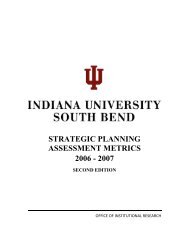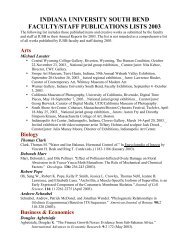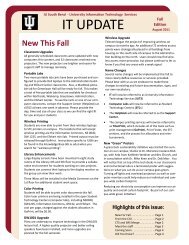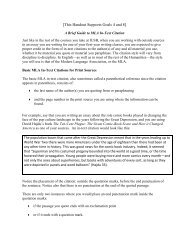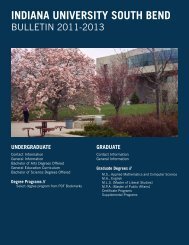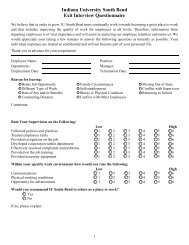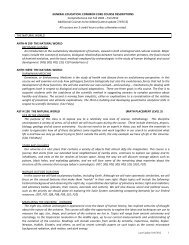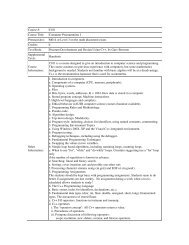Current version - Indiana University South Bend
Current version - Indiana University South Bend
Current version - Indiana University South Bend
Create successful ePaper yourself
Turn your PDF publications into a flip-book with our unique Google optimized e-Paper software.
883 SCHOOL OF BUSINESS AND ECONOMICS<br />
Finance<br />
The ability to analyze a corporation’s financial status,<br />
and to implement sound financial programs for raising<br />
capital and for choosing from among competing<br />
investment opportunities, is of the utmost importance to<br />
any business organization.<br />
Students who graduate with a finance concentration<br />
are prepared for entry-level positions in finance. This<br />
includes positions in financial institutions such as<br />
commercial banks, savings and loans, credit unions,<br />
brokerage and investment banking firms, investment<br />
advisory organizations, insurance companies, mutual<br />
funds, and pension funds. In addition to opportunities<br />
in the financial services industry, extensive employment<br />
opportunities exist in the corporate sector as well as in<br />
government.<br />
Courses on financial institutions, financial decision<br />
making, business financial management, investments,<br />
security analysis, and portfolio management enable<br />
students to acquire a depth of understanding in areas of<br />
particular interest.<br />
The field of finance traditionally is divided into three<br />
subfields: financial markets and institutions, investments,<br />
and business financial management. Financial markets<br />
and institutions examine the ways in which financial<br />
intermediaries such as commercial banks, insurance<br />
companies, and pension funds facilitate the transfer<br />
of funds from savers/investors to demanders of funds<br />
who engage in the production and consumption of real<br />
economic goods and services.<br />
Services provided by financial institutions include the<br />
evaluation and bearing of risk and the repackaging<br />
of funds in terms of maturity and size of investment.<br />
Also examined, on a macro basis, are the markets for<br />
financial securities created by corporations and financial<br />
intermediaries.<br />
Typical questions would be what sectors of government<br />
and the economy are the foremost demanders of funds<br />
in different segments of the business cycle and, in<br />
aggregate, what proportion of corporate financing has<br />
been provided by debt over time.<br />
Investments is the study of how individuals and<br />
institutions allocate funds to financial assets such<br />
as stocks, bonds, options and futures contracts and,<br />
to a lesser extent, real assets such as real estate and<br />
precious metals. Investments is itself divided into two<br />
areas: security analysis, concerned with the valuation<br />
of individual securities; and portfolio management,<br />
concerned with the selection of combinations of assets<br />
such that return is maximized given the level of risk that<br />
is borne.<br />
Business financial management concentrates on the<br />
management of a firm’s assets, both short-term working<br />
capital and longer-term capital projects, and on the<br />
financing of these assets. Financing considerations<br />
include the choice of capital structure (proportions of<br />
debt and equity used in the financing mix) and dividend<br />
policy.<br />
Concentration Requirements<br />
(All courses are 3 credit hours, unless otherwise designated.)<br />
Junior and Senior Years<br />
BUS-F 302 Financial Decision Making<br />
BUS-F 345 Money, Banking, and Capital<br />
Markets<br />
BUS-F 420 Equity and Fixed Income<br />
Investment<br />
BUS-F 444 Applications in Financial<br />
Management<br />
Select three of the following:<br />
BUS-A 311 Intermediate Accounting I<br />
BUS-A 312 Intermediate Accounting II*<br />
BUS-A 325 Cost Accounting*<br />
BUS-F 423 Topics in Investment<br />
BUS-F 446 Bank and Financial Intermediation<br />
BUS-F 490 Independent Study in Finance<br />
BUS-F 494 International Finance<br />
Students must attain a grade of not less than C in each<br />
course.<br />
Minor in Finance for Business Majors<br />
Students pursuing a four-year degree may combine<br />
formal study in finance as they pursue a major<br />
concentration in one of the functional areas. Students<br />
who elect this program must notify their advisor before<br />
the end of their junior year.<br />
Requirements (12 cr.)<br />
(All courses are 3 credit hours, unless otherwise designated.)<br />
BUS-F 301 Financial Management<br />
BUS-F 302 Financial Decision Making<br />
BUS-F 345 Money, Banking, and Capital<br />
Markets<br />
BUS-F 420 Equity and Fixed Income<br />
Investment<br />
Students must attain a minimum cumulative grade point<br />
average of 2.0 (C) in all four of the courses taken for the<br />
minor, and not less than a C in each course. Note that<br />
these courses may not be taken by correspondence study<br />
nor independent study; they also may not be studied<br />
through an internship.<br />
General Business<br />
For students wishing to pursue a broad, general<br />
degree program, this curriculum provides a vehicle for<br />
organizing their studies. The integrating focus is the<br />
responsibility for administering the multiple operations<br />
of the business firm in a rapidly changing environment.<br />
Emphasis is on the process involved in setting goals for<br />
corporate effort, coordinating and controlling multiple<br />
programs, and regulating inputs and outputs with varied<br />
environments.<br />
* Credit not given for both BUS-A 312 and BUS-A 325



